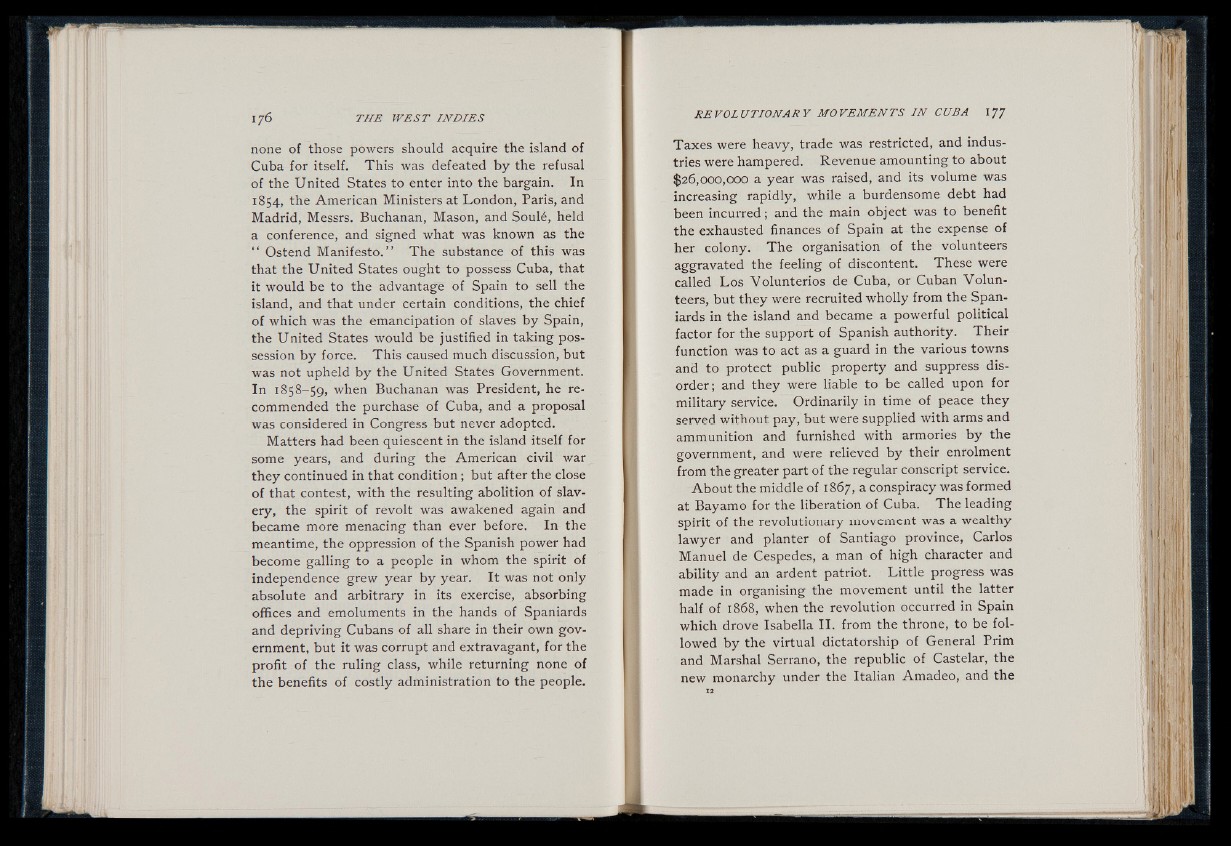
none of those powers should acquire the island of
Cuba for itself. This was defeated b y the refusal
of the United States to enter into the bargain. In
1854, the American Ministers at London, Paris, and
Madrid, Messrs. Buchanan, Mason, and Soul6, held
a conference, and signed what was known as the
“ Ostend Manifesto.” T h e substance of this was
that the United States ought to possess Cuba, that
it would be to the advantage of Spain to sell the
island, and that under certain conditions, the chief
of which was the emancipation of slaves b y Spain,
the United States would be justified in taking possession
b y force. This caused much discussion, but
was not upheld by the United States Government.
In 1858-59, when Buchanan was President, he recommended
the purchase of Cuba, and a proposal
was considered in Congress but never adopted.
Matters had been quiescent in the island itself for
some years, and during the American civil war
they continued in that condition; but after the close
of that contest, with the resulting abolition of slavery,
the spirit of revolt was awakened again and
became more menacing than ever before. In the
meantime, the oppression of the Spanish power had
become galling to a people in whom the spirit of
independence grew year by year. I t was not only
absolute and arbitrary in its exercise, absorbing
offices and emoluments in the hands of Spaniards
and depriving Cubans of all share in their own g o vernment,
but it was corrupt and extravagant, for the
profit of the ruling class, while returning none of
the benefits of costly administration to the people.
T a x e s were heavy, trade was restricted, and industries
were hampered. Revenue amounting to about
$26,000,000 a year was raised, and its volume was
increasing rapidly, while a burdensome debt had
been incurred; and the main object was to benefit
the exhausted finances of Spain at the expense of
her colony. T h e organisation of the volunteers
aggravated the feeling of discontent. These were
called L o s Volunterios de Cuba, or Cuban Volunteers,
but they were recruited wholly from the Spaniards
in the island and became a powerful political
factor for the support of Spanish authority. Their
function was to act as a guard in the various towns
and to protect public property and suppress disorder;
and they were liable to be called upon for
military service. Ordinarily in time of peace they
served without pay, but were supplied with arms and
ammunition and furnished with armories by the
government, and were relieved by their enrolment
from the greater part of the regular conscript service.
Ab ou t the middle of 1867, a conspiracy was formed
at Bayamo for the liberation of Cuba. T h e leading
spirit of the revolutionary movement was a wealthy
lawyer and planter of Santiago province, Carlos
Manuel de Cespedes, a man of high character and
ability and an ardent patriot. L ittle progress was
made in organising the movement until the latter
half of 1868, when the revolution occurred in Spain
which drove Isabella I I. from the throne, to be followed
by the virtual dictatorship of General Prim
and Marshal Serrano, the republic of Castelar, the
new monarchy under the Italian Amadeo, and the
12